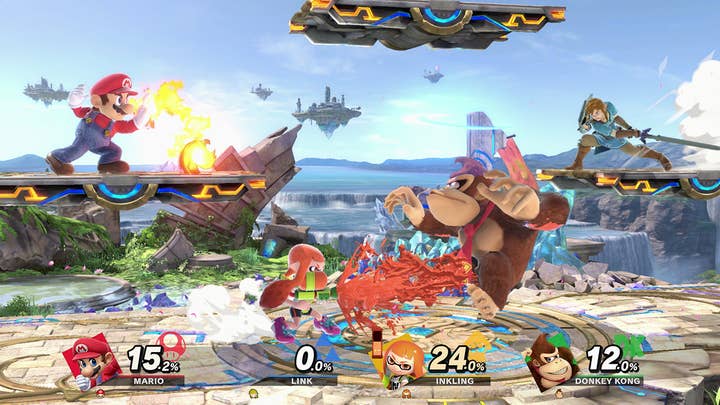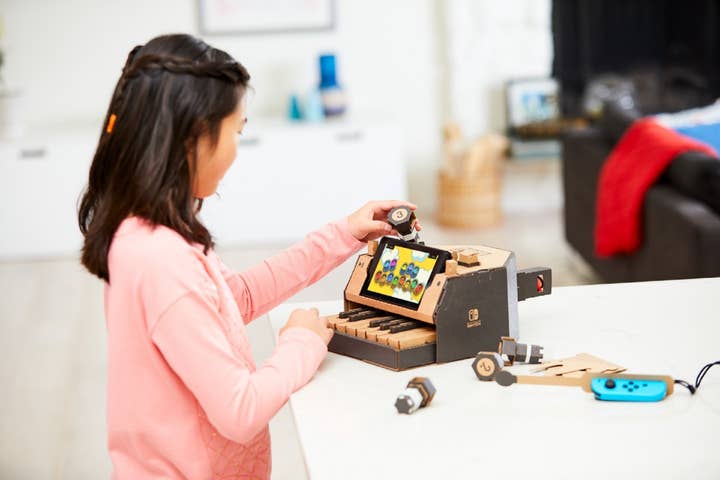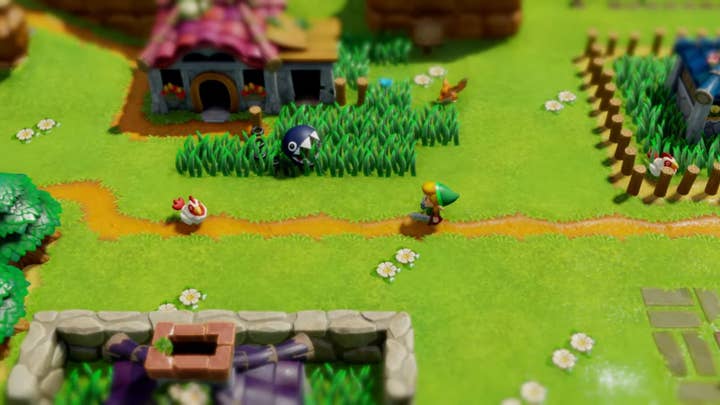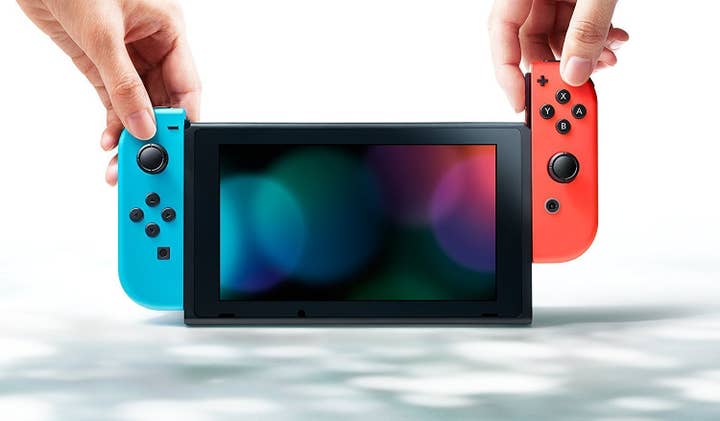Nintendo's greatest strength this generation is self-acceptance | Opinion
The platform holder has returned to its roots, and it is stronger and more well-rounded as a result
There's been a notable change to the way Nintendo does business over the last five years, and last month company president Shuntaro Furukawa put it into words for investors.
During the early 2000s, Nintendo famously felt that the increasing complexity of video games was causing fewer and fewer people to engage with them. This line of thinking affected everything from The Legend of Zelda (with games like Phantom Hourglass and Skyward Sword designed to be simpler and more approachable takes on the Zelda school of design) to the company's game devices, with hardware innovations like the Nintendo DS (easy-to-use touch screen controls and puzzle games) and Wii (motion controls and an almost singular focus on gaming as a physical activity).
These changes and innovations to their design approach, Nintendo felt, would allow them to "expand the gaming population" and entice more people to pick up video games.
The idea was that if they could release a large number of games and game devices that were easy to use, more people would be willing to engage with video games as a hobby, and this would lead to an increase in the total number of people spending money on games and the games industry. In the ideal scenario, these people would eventually "graduate" from simpler games like Wii Sports to more complex games and turn into lifelong fans of the medium.
"In making games more approachable, Nintendo had neglected to draw a clear line that would lead users from a Wii Sports or a Mario to, say, a Zelda or Metroid"
There was just one problem: while Nintendo did indeed manage to get a large number of people to buy a Nintendo DS with Brain Age, most of those people never went on to buy a game like Zelda: Phantom Hourglass. Likewise, while a large number of people did buy a Wii with Wii Sports or New Super Mario Bros Wii, the vast majority of them never graduated to more complex Wii games.
In executing their vision to simplify games and make them more approachable, Nintendo had neglected to draw a clear line that would lead users from a Wii Sports or a Mario to, say, a Zelda or Metroid. This led to a half-fulfilled vision of sorts, where there were more people engaging with games, but more because Brain Age and Wii Sports were trendy, rather than because they were interested in the medium.
Luckily, there were others to pick up the baton. As time would go by, smartphones would continue what Nintendo had started and make video games more accessible to a large number of people. Free-to-play payment models and the rise of smaller indie games would make them more affordable. In parallel, game developers both large and small would create an appetite for games that were complex, deep, and even weird, with more and more people willing to engage not just with major brands, but also smaller, more experimental games.
By 2015, it would become obvious that the industry had managed to avert the "gamer drift" catastrophe that Nintendo was concerned about in the early 2000s. Nintendo themselves would develop far fewer "casual" games on devices like the Nintendo 3DS and Wii U during this period, with both those machines known for much more traditional, meaty experiences.
This brings us to last month, and the company laying out their current approach, which they say they began pursuing around 2014.

During a quarterly investor briefing where the firm reported that it plans on selling 110 million units of software for its Nintendo Switch console this fiscal year, company president Shuntaro Furukawa stated that in an era where everyone has access to games, Nintendo's approach is no longer to expand the gaming population, but to focus on expanding awareness of their own brands.
"Over the last five years, we've seen games from Nintendo that are no longer afraid to be complex, challenging, and more deeply engaging"
"Within this changing environment [of games being accessible to everyone], we redefined our strengths," Furukawa said. "In addition to our development capabilities in creating integrated hardware-software products, we pursued discovery of new business opportunities by focusing on the game characters and worlds we have built up over the history of Nintendo's home entertainment systems, considering this IP as our starting point, and by expanding this IP.
"At that time, our basic strategy became 'expand the number of people who have access to Nintendo IP,' and we began working on actively leveraging the worldwide ubiquity of smart devices and on our IP expansion business, which includes theme parks, video content, and character merchandising."
Put simply, Nintendo has returned to its roots.
During the Nintendo DS and Wii era, Nintendo's singular goal was to get non-gamers to engage with games using the allure of simplicity. However, the current Nintendo recognizes that games are now a mainstream form of entertainment, and that this dramatically changes the company's role in the industry. That they can now take advantage of the widespread acceptance of video games as a mainstream hobby, and use it to their benefit. That they can focus on introducing newer generations to their brands through more traditional means and by playing to their strengths, instead of reinventing the wheel each time.
Over the last five years, we've seen games from Nintendo that are no longer afraid to be complex, challenging, and more deeply engaging. We've heard plans for big-budget Hollywood movies that are to be released across the globe. Theme parks run by Universal Studios. Re-releases of their classic consoles, such as the NES and SNES. And of course merchandise.

Even something like Nintendo Labo, which is very reminiscent of a Wii-era experiment, is far more demanding of the player than Wii Sports. Half the fun of a Labo Kit is building it, and this requires time, patience, and dedication -- the polar opposite of Nintendo's design mantra during the Wii generation, but exactly the sort of thing that is widely adored about games these days.
This return-to-roots approach also allows for the company to better maintain an ongoing relationship with its core users, which is something they've become increasingly cognisant of these past few years. Nintendo first began extensively experimenting with ongoing support for its games during the Nintendo 3DS days, with titles like Fire Emblem: Awakening receiving a large amount of both free and paid downloadable content. The experiment worked, and by the time games like Splatoon, Hyrule Warriors, and Super Smash Bros. for 3DS/Wii U were deep in development, Nintendo was banking on DLC to help bring in more revenue and keep users playing their games for longer.
These days, just about every major Nintendo game is treated as a service, rather than a one-time purchase, whether it's Splatoon 2 or Super Smash Bros. Ultimate or Arms. Even single-player focused games like Xenoblade Chronicles 2 have received large expansion packs to entice players to go back.
"Hardware sell-through remains very important as a key performance indicator (KPI), for our company, but I think that the number of hardware units in active use is an equally important KPI," Furukawa said to investors in acknowledgement of Nintendo's approach to user engagement. "[...] The reason why these numbers in active use are important is because consumers who continue to play with the hardware have more opportunities to purchase subsequent software. To keep consumers using the hardware, we must first and foremost continue to release new software, and we also need to provide ways such as add-on content so that consumers can play one title for a longer time."
If that sounds like something you'd expect to hear out of Xbox or PlayStation (or even a company like EA), it's because it is. Nintendo is starting to approach their business like a platform holder should.

And yet, this isn't really new to them. Even before their DLC experiments on the 3DS, for the better part of its life, Nintendo was always in the business of creating deep, engaging, "gamey" games that you could play over and over. The only difference is you can now ask a user to pay more than once to keep playing something they enjoy, and the kind of games Nintendo traditionally likes to make fit this business model incredibly well. One sometimes tends to forget that Nintendo is the game company. They helped create the foundation that the rest of the industry built itself upon, and so it only makes sense that they would benefit the most, now that video games are a widely accepted mainstream hobby.
"With the industry finally at a point where games are a widely accepted hobby, Nintendo can be confident in its game design philosophy, without feeling the need to reinvent the wheel every time."
Shigeru Miyamoto, who has been a major guiding force at Nintendo, describes it best: "In comparison with the era of 'expanding the gaming population,' the current situation seems like a dream situation to us because the number of consumers with access to games has expanded to a large degree. And now they have a better understanding of digital media, so a really good idea can lead to a huge business in the blink of an eye."
So, how else does Nintendo plan on keeping savvy customers engaged outside of DLC? Again, look no further than what platforms like Xbox and PlayStation are already doing -- using their online services to maintain long-term relationships with their users. While the Nintendo Switch Online service allows subscribers to play a handful of free NES games each month, Furukawa says there's more features on the way, to give the service greater value.
"Making long-term services like Nintendo Switch Online more appealing can also contribute to maintaining the utilization of the hardware," says Furukawa. He later reinforces the need to keep Switch owners paying for the online service year after year, stating: "It is critical that these [Nintendo Switch Online subscribers] continue using the service for a long time rather than letting it expire, and for that we need to build relationships with consumers and enrich the content. With this in mind, we are currently planning ways to boost the appeal of the service on a yearly basis."
To sum up Furukawa's comments, Nintendo will do three things to facilitate their continued success:
- Make games and services that people want to keep coming back to
- Use their IP actively, utilizing it to reach a wide range of audiences
- Promote their brands intelligently
When you put it like that, it doesn't seem like rocket science, does it? But that is the point.
While the DS and Wii were fantastic innovations for their time (and helped spark the smartphone gaming boom that would play a major role in expanding the gaming population), Nintendo's long-term strength has always been its ability to create deep, engaging games that keep bringing people back for more. With the industry finally at a point where games are a widely accepted hobby, the company can be confident in its game design philosophy, without feeling the need to reinvent the wheel every time.
It's a Nintendo whose future no longer seems dependent on untested, crazy ideas, and that's got to afford them some sense of relief. Meanwhile, for ardent Nintendo fans, it means more games like Splatoon and Xenoblade, with the occasional sprinkling of experiments like Labo. It's made for a happier, more well-balanced equation for Nintendo and the gaming audience, and ultimately, all it took was self-acceptance.
Ishaan Sahdev is the former editor-in-chief of video games news site Siliconera.
